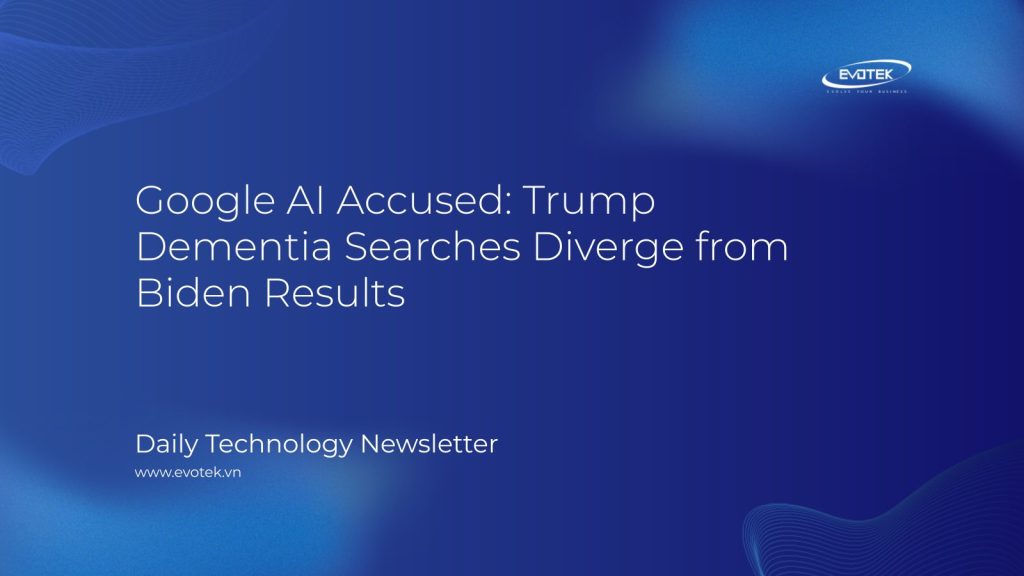Google’s artificial intelligence search function is facing accusations of withholding AI-generated summaries for queries concerning Donald Trump’s mental health, particularly regarding dementia. This alleged disparity in search results raises questions about information accessibility and potential bias in AI-powered search.
The Discrepancy in AI Overviews
When users type prompts such as "does Trump show signs of dementia" into Google’s search bar, the system reportedly displays only a list of websites, often accompanied by the message, "An AI Overview is not available for this search." Switching to Google’s dedicated AI mode for such queries similarly yields no generated summary, presenting the same top web page results instead. The same behavior is observed for searches about Trump showing signs of Alzheimer’s.
This contrasts sharply with how Google’s AI handles similar inquiries about President Joe Biden. For prompts like "does Biden show signs of dementia", Google’s AI mode provides a comprehensive summary. This summary often acknowledges the complexity of the question, stating, "Assessing whether Joe Biden shows signs of dementia is a complex question with various perspectives and differing conclusions." It also lists potential factors contributing to cognitive decline or perceived signs of dementia, and when queried about Alzheimer’s, notes the absence of a definitive answer without a formal medical diagnosis.
The AI summary for Biden’s mental health even references Special Counsel Robert Hur’s report, which described the 82-year-old as a "well-meaning, elderly man with a poor memory," presenting both sides of the ongoing public discussion.
Scrutiny Over Trump’s Cognitive Acuity
Both the 79-year-old former president and the 82-year-old current president have faced public scrutiny regarding their cognitive abilities. However, critics argue that Trump has not received the same level of in-depth AI-generated information in Google’s search results, despite numerous public incidents that have fueled concerns.
These incidents include:
- Incoherent and rambling public speeches.
- Frequent memory lapses.
- Misremembering basic facts about his own life.
- Making unsubstantiated claims, such as falsely stating his uncle, John Trump, taught the Unabomber, Ted Kaczynski, at MIT.
- Reportedly failing to recall that his first inauguration was in January 2017, instead claiming his term began in 2016 during a recent press conference.
Dr. John Gartner, a psychologist, speaking on the Daily Beast Podcast, suggested that Trump’s "major deterioration" in language skills could be indicative of dementia. Gartner noted a decline in vocabulary and an inability to complete thoughts or even words, a stark contrast to his past speaking patterns.
Trump, who often refers to himself as a "very stable genius," has consistently dismissed any suggestions of mental decline, frequently citing his passing of the Montreal Cognitive Assessment (MoCA), a test designed to detect cognitive impairment.
Google’s Response and Broader Implications
In response to the allegations, a Google spokesperson stated that their systems automatically determine where an AI response will be useful, and this process is not always "100 percent consistent." The company clarified that AI Overviews are not displayed for every query, and for certain topics like current events, AI mode may simply show a list of links.
However, publications like The Verge have speculated that Google might be wary of the former president’s reaction to potentially sensitive AI-generated content. This speculation comes as Google-owned YouTube recently agreed to a $24.5 million settlement in a lawsuit filed by Trump after his account was suspended following the January 6, 2021, Capitol attack.
The differing AI search results for high-profile political figures underscore a growing debate about transparency, bias, and the responsibility of powerful search engines in shaping public access to information, especially on sensitive topics like cognitive health and presidential fitness.

 日本語
日本語 한국어
한국어 Tiếng Việt
Tiếng Việt 简体中文
简体中文